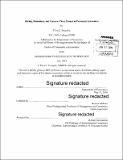Hiring, recessions, and careers : three essays in personnel economics
Author(s)
Forsythe, Eliza C. (Eliza Carla)
DownloadFull printable version (7.809Mb)
Other Contributors
Massachusetts Institute of Technology. Department of Economics.
Advisor
Robert Gibbons.
Terms of use
Metadata
Show full item recordAbstract
Workers find wage-growth and job-satisfaction by building careers. However a worker's ability to string together a sequence of jobs relies on the availability of appropriate opportunities either within their current firm or in other firms in the market. In this thesis, I investigate how variation in the labor market affects this career building process. In the first chapter, I find that career opportunities are scarce for young workers during recessions, and use theory and evidence to argue that this is due to firms choosing to hire more experienced workers instead. In the second chapter, I find that firms reallocate their employees between occupations during recessions, leading workers to receive lower wages and be employed in lower-quality occupations. In the third chapter, I develop a model to explain why workers change firms when opportunities exist within the firm. I show that heterogeneity in firms' production functions and human capital acquisition are sufficient to generate these movements. More specifically, in the first two chapters I use data from the CPS to study reallocations over the business cycle. In Chapter 1, I find that during recessions the probability of being hired falls for young workers, while for experienced workers it rises. I develop a model and show this fact can be explained by firms choosing to hire workers with greater work experience when labor markets are slack. My model provides the distinctive prediction that during recessions, young workers will match with lower-quality jobs and receive lower wages while experienced workers will exhibit no change in either dimension. I develop occupational quality indices using O*NET and OES data and find evidence consistent with both predictions, suggesting that firms' hiring behavior actively contributes to negative outcomes for young workers during recessions. In Chapter 2, I document that occupational mobility is counter-cyclical. I show this is driven by an increase in occupational mobility within firms. I show that these within-firm occupation changers lose ground during recessions, matching with lower-quality jobs and receiving lower wages. Combined with the recessionary increase in within-firm mobility, these results suggest a previously undiscovered cost of recessions borne by employed workers. Finally, in Chapter 3, I develop a model that demonstrates how career-advancing inter-firm mobility can persist despite the possibility of within-firm mobility. I argue that many of these movements are driven by firm heterogeneity and human capital acquisition and show such a model can capture three key empirical regularities: experienced workers are hired into advanced positions, wages rise more at movements between positions (within and between firms) than at stays in the current firm, and external hires tend to have different qualifications than internal promotees. JEL Classification: E24, J62, M51.
Description
Thesis: Ph. D., Massachusetts Institute of Technology, Department of Economics, 2014. Cataloged from PDF version of thesis. Includes bibliographical references (pages 100-103).
Date issued
2014Department
Massachusetts Institute of Technology. Department of EconomicsPublisher
Massachusetts Institute of Technology
Keywords
Economics.